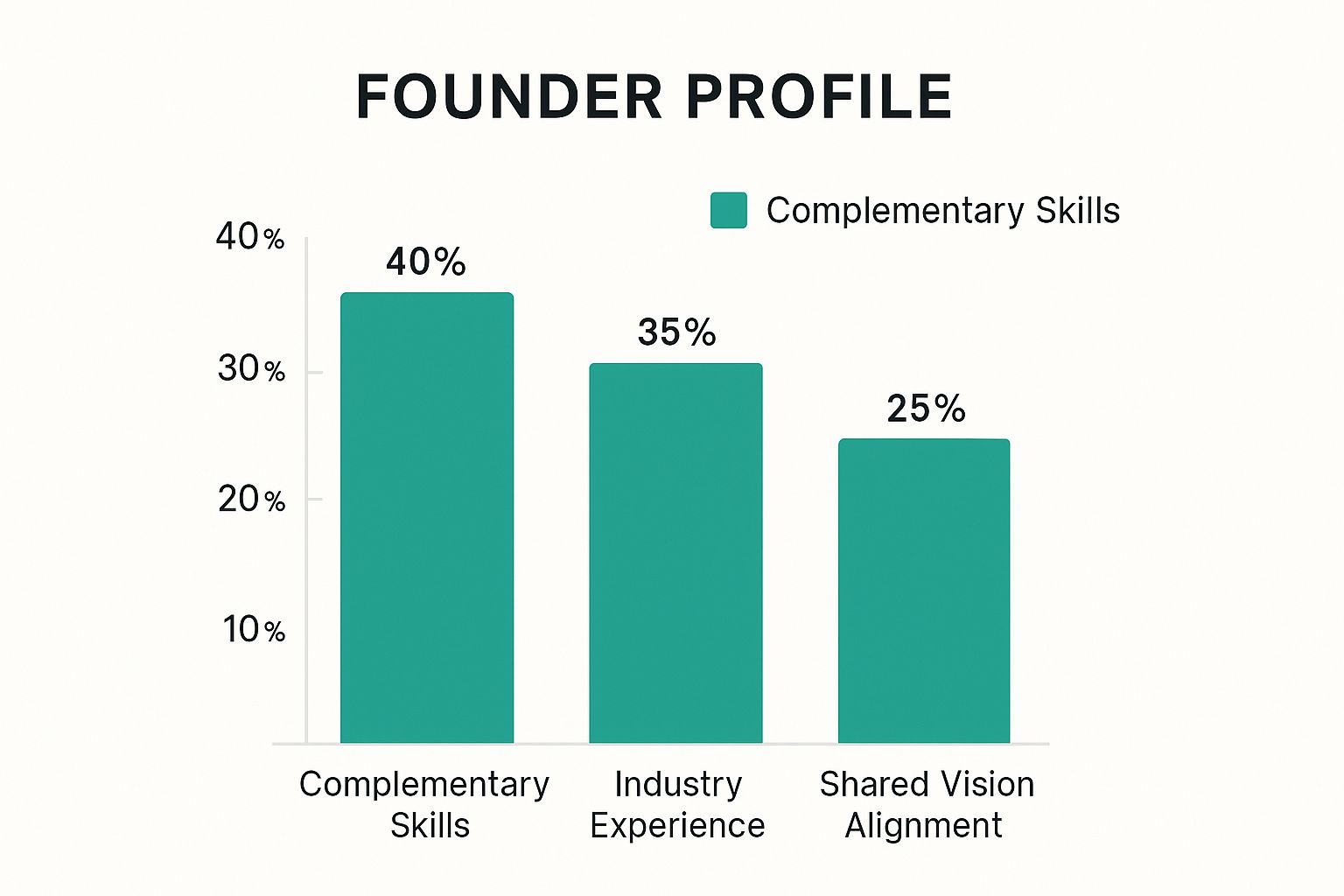Why Finding a Cofounder Changes Your Startup's Trajectory
Finding the right cofounder can significantly impact your startup's journey. It's not just about splitting the workload; it's about bringing diverse perspectives, increasing resilience, and improving your decision-making process. This collaborative approach can set your startup on a path of accelerated growth and lasting success.
The Power of Shared Vision and Complementary Skills
One of the most compelling reasons to find a cofounder is the potential for complementary skills. Imagine one founder has deep technical expertise, while the other excels in business development and marketing. This synergy creates a powerful combination, allowing each founder to focus on their strengths and build a well-rounded, efficient operation. This dynamic is particularly valuable in the fast-paced startup environment, where agility and adaptability are essential.
A shared vision is equally important. When cofounders are aligned on goals and values, it creates a strong foundation for navigating challenges and making critical decisions. This shared understanding fosters unity and purpose, vital for maintaining momentum during difficult times.
Resilience and Enhanced Decision-Making
Building a startup is an emotional rollercoaster, filled with challenges, setbacks, and moments of doubt. A cofounder offers a vital support system, someone to share the burdens and celebrate the victories. This shared experience builds resilience, allowing the team to overcome adversity and stay focused on long-term objectives.
Having multiple perspectives in the decision-making process also significantly improves the quality of those decisions. Cofounders can challenge assumptions, identify blind spots, and explore different approaches, leading to more informed and strategic choices. This collaboration mitigates the risks of isolated decision-making, a common challenge for solo founders.
Statistical Evidence and Funding Success
The advantages of having a cofounder are not just anecdotal. Studies show a link between partnerships and startup success. Startups with complementary cofounders have a 30% higher success rate than those with single founders. This improved success rate comes from the diverse skillsets, expertise, and perspectives multiple founders bring, strengthening both decision-making and resilience. This is especially valuable in challenging sectors like the tech industry, which faces a 63% five-year failure rate. Learn more about startup statistics here: Startup Statistics Guide

Furthermore, a strong founding team can significantly improve your chances of securing funding. Investors often see a well-rounded team as a key indicator of a startup's potential. This can lead to increased investor confidence, better funding terms, and a higher likelihood of securing the capital needed to scale your venture. Ultimately, finding the right cofounder can be a critical factor in transforming your startup from a solo endeavor into a collaborative powerhouse.
The Magic Number: Solo Founders vs. Founding Teams
Finding the right co-founder can significantly impact your startup's journey. But is there a perfect number of founders that guarantees success? The answer isn't simple. This section explores the dynamics of founder teams to help you decide the best approach for your venture.
Balancing Speed and Control: The Solo Founder's Journey
Solo founders often have complete control over their vision. This allows for quick decisions and streamlined execution. However, this also means bearing all the responsibility, which can lead to burnout and potentially slower growth due to limited expertise. It's like a speedboat – nimble and fast, but with limited capacity.
Shared Burden, Accelerated Growth: The Power of Two
Adding a second founder introduces shared responsibility, diversifying skills and lessening the burden on each individual. This partnership can lead to faster growth, with two founders able to accomplish more than one. Think of it like a catamaran – stable, quick, and capable of carrying more. Building a strong founding team requires excellent collaboration. Check out these team collaboration best practices.
Navigating Complexity: The Dynamics of Larger Teams
Expanding beyond two founders adds complexity to team dynamics and decision-making. While offering a wider range of expertise, larger teams can face communication challenges and slower decisions. Imagine a large sailing vessel – powerful, but requiring a bigger crew and more coordination. Considering the role of co-founders in startup success means looking at the data. Paul Graham suggests solo founders have a 2.3x higher chance of being in the top 10% of successful startups compared to teams of four or more. However, Wharton research indicates solo founders take 3.6 times longer to outgrow the startup phase compared to a team of two. This shows the complexity of finding the right number of co-founders. Learn more about the founder factor on startup success.
Finding the Right Fit: Assessing Your Needs
To help visualize the key aspects of a strong founder profile, take a look at the infographic below.

This infographic shows the key components: complementary skills (40%), industry experience (35%), and shared vision (25%). Complementary skills are the most crucial, highlighting the importance of a balanced team. The data emphasizes choosing a co-founder who shares your vision and brings complementary expertise. Ultimately, the ideal team size depends on your venture. Consider your business's complexity, the required skill sets, your preferences, and your long-term vision. Are you a solo founder seeking a partner to complement your skills? IndieMerger can help. Our platform connects verified founders with complementary expertise, helping you find a co-founder who aligns with your vision and accelerates your startup's growth.
The following table summarizes some key differences between solo founders and co-founding teams:
Solo Founders vs. Co-founding Teams
This table compares key performance metrics and characteristics between solo founders and various co-founding team sizes.
| Metric |
Solo Founder |
Two Co-founders |
Three+ Co-founders |
| Control |
High |
Shared |
Distributed |
| Speed |
Fast initially, can slow down later |
Faster Growth Potential |
Can be slower due to decision-making processes |
| Workload |
Heavy burden on individual |
Shared responsibility |
Distributed, but can lead to management overhead |
| Expertise |
Limited by individual skills |
Broader range of skills |
Potentially wider expertise, but risk of dilution of focus |
| Risk of Burnout |
High |
Reduced |
Lower, but potential for interpersonal conflicts increases |
| Funding Potential |
Can be challenging |
Often seen as more attractive to investors |
Can attract more funding, but equity distribution becomes more complex |
In conclusion, while solo founders have complete control, teams benefit from shared responsibility and diverse skills. Larger teams offer broader expertise but can face communication challenges. The right fit depends on your specific needs and vision.
Where Exceptional Cofounders Are Actually Hiding

Finding the perfect cofounder can feel like searching for a needle in a haystack. While some founders try their luck on popular platforms, truly exceptional partnerships often blossom in unexpected places. This means venturing beyond the typical networking circuit and exploring less conventional avenues.
Beyond the Usual Suspects: Untapped Resources for Cofounder Discovery
Many founders initially turn to generic platforms, but often find the experience disappointing. These platforms frequently lack the specialized focus needed to connect founders with truly compatible partners.
Instead, concentrate your search on platforms known for delivering results. For instance, IndieMerger provides a more curated experience. It connects verified founders based on complementary skills and a shared vision, increasing your chances of a strong match.
Also, consider exploring niche communities within your industry. Think industry-specific Slack groups, online forums, or even focused local meetups. These communities provide a rich pool of potential cofounders who understand your industry and share your passion. This shared understanding is invaluable when building a successful partnership.
Networking Reimagined: Strategies for Meaningful Connections
Networking is crucial, but traditional methods can be ineffective. Rather than simply collecting business cards, focus on building genuine relationships.
Attend events related to your specific industry interests. This allows you to connect with potential cofounders on a deeper level, sharing ideas and exploring common goals.
However, approach potential cofounders with tact. Avoid appearing desperate or unprepared. Focus on establishing a genuine connection by showcasing your expertise and passion, while actively listening to their perspectives. This creates mutual respect and lays the groundwork for a more substantial partnership.
Expanding Your Horizons: Rethinking Your Search Parameters
While having specific criteria is important, excessive rigidity can limit your options. Think outside the box and consider expanding your search parameters without sacrificing core values. This may involve looking beyond your immediate network or considering candidates with unconventional backgrounds. An open mind can uncover unexpectedly fruitful partnerships.
Assessing and Selecting the Right Fit
Finding potential cofounders is only the first step. A rigorous vetting process is essential for ensuring a successful partnership. The following table compares popular platforms and communities, offering valuable insights into their strengths and weaknesses.
To help you make an informed decision, we've compiled a comparison of popular cofounder matching platforms. This table breaks down their specializations, vetting processes, success rates, and costs.
Top Cofounder Matching Platforms Comparison
Detailed comparison of popular platforms and communities for finding potential cofounders
| Platform |
Specialization |
Vetting Process |
Success Rate |
Cost |
| IndieMerger |
Tech, Marketing, Business |
Verified Profiles |
High |
One-time lifetime access |
| Platform B |
General |
Basic Application |
Medium |
Subscription-based |
| Community C |
Industry-specific |
Community Moderation |
Varies |
Often free |
As you can see, choosing the right platform is essential. Consider factors like specialization, how they vet potential cofounders, their reported success rate, and the overall cost. This careful evaluation will save you time and ultimately help you find the perfect cofounder. Are you ready to find a cofounder? IndieMerger can help you connect with verified founders who share your vision. Visit IndieMerger today to start your search.
The Cofounder Skills Matrix That Actually Predicts Success
Finding the right cofounder isn't simply about filling skill gaps. It's about strategic synergy. You need a team that amplifies strengths and minimizes weaknesses. This requires understanding which skills truly complement one another, especially in your specific industry.
Identifying the "Power Couples" of Skill Sets
Some skill pairings consistently outperform others. A technically proficient founder paired with a business-focused cofounder, for instance, can be incredibly effective. The technical founder builds the product. The business founder handles market strategy, sales, and funding.
This division of labor lets each founder focus on their expertise. This maximizes efficiency and impact.
Don't underestimate the power of soft skills either. A visionary leader partnered with a detail-oriented executor can accomplish impressive things. The visionary charts the course and motivates the team. The executor ensures plans are implemented precisely and effectively.
Mapping Your Strengths and Weaknesses Honestly
Finding a complementary cofounder requires brutal honesty about your own abilities. What are you truly good at? Where do you need support?
Create a personal skills matrix. Objectively assess your capabilities. Understanding your limitations helps you identify partners who fill those gaps.
Seeking Complementary Skills, Not Mirrored Limitations
Many founders seek partners similar to themselves. While comfortable, this approach often creates a team with shared blind spots.
Instead, look for individuals who excel where you struggle. This diverse perspective strengthens your team and reduces the risk of overlooking critical details. If you're a strong idea generator, for example, partner with someone who excels at execution and follow-through.
Local Expertise and Startup Success
Location significantly influences a startup's trajectory. Failure rates vary widely by region. In the USA and Canada, failure rates reach 80% and 90%, respectively. Similarly, 90% of startups fail in India. The UK has a lower failure rate at 60%. These differences reflect the influence of local markets, regulations, and competition.
A cofounder with local knowledge can be incredibly helpful in navigating these region-specific challenges. Learn more about these statistics: Startup Failure Statistics This underscores the value of a cofounder who not only complements your skills, but also understands your target market’s nuances. Ready to find a cofounder who completes your startup? IndieMerger connects verified founders with complementary expertise, helping you find the ideal partner.
The Cofounder Interview Process That Reveals Everything

Traditional job interviews often miss the mark when it comes to finding a co-founder. You're not simply hiring; you're choosing a business partner. This requires a deeper process that goes beyond skills and experience. It's about understanding values, work ethic, and how they handle pressure.
Beyond the Resume: Evaluating Cofounder Compatibility
Standard interview questions won't reveal the key ingredients of a strong partnership. Forget the typical “tell me about yourself” and dig into deeper compatibility. You need a structured framework that identifies potential issues before they become major problems.
For example, instead of asking about past wins, present hypothetical business challenges. Observe how potential co-founders analyze, strategize, and decide. This reveals their problem-solving and decision-making styles. Do they mesh with yours?
Additionally, explore their values and long-term vision. What drives them to join your venture? Are they committed for the long haul or seeking a quick exit? Understanding their motivations is key for long-term alignment and avoiding future conflicts.
Unveiling Hidden Dynamics: Stress Tests and Scenario Planning
How will your potential co-founder react under pressure? Simulated business challenges and stress tests can provide valuable insights. Present tough scenarios like a sudden market downturn or a major product defect.
This lets you see their problem-solving skills under fire. Do they stay calm and analytical, or become overwhelmed and reactive? These exercises reveal how they handle conflict, stress, and disagreements – all vital factors in a startup’s journey.
Asking the Unexpected: Revealing Values and Risk Tolerance
Certain questions consistently expose misalignments in core values, work ethic, and risk tolerance—questions often skipped in traditional interviews.
- How do they define success?
- What’s their preferred work style?
- What are their expectations regarding work-life balance?
- How comfortable are they with risk?
These seemingly simple questions can uncover significant differences that could impact your partnership’s success.
Red Flags: Recognizing Warning Signs Early On
Experienced founders often reflect and wish they'd spotted early red flags.
- Inconsistency: Do their actions match their words? Do they follow through?
- Lack of Accountability: Do they take ownership of mistakes, or deflect blame?
- Resistance to Feedback: Are they open to constructive criticism, or defensive?
These red flags can indicate potential future issues. Recognizing them early can save you time, resources, and headaches. Ready to find a co-founder aligned with your vision and working style? IndieMerger connects verified founders with complementary skills.
Structuring Fair Founder Agreements That Prevent Disaster
A successful co-founder relationship thrives on more than just a shared vision. It requires a solid legal framework, a founder agreement, that safeguards everyone involved and allows the venture to flourish even when facing challenges. This goes beyond simply dividing equity; it's about establishing a foundation built on fairness, transparency, and the ability to adapt.
Beyond the Equity Split: Building a Flexible Framework
While the initial equity split is important, a rigid structure can create resentment if circumstances change. Think of your founder agreement as a living document. It should adapt to the evolving needs of your business as roles, contributions, and priorities shift. This proactive approach can prevent misunderstandings and maintain a healthy working relationship.
Aligning Incentives for Long-Term Success
A well-structured agreement aligns everyone's incentives with the long-term success of the venture. Performance-based vesting, where equity is earned over time based on achieving milestones, is a good option. This rewards contributions, promotes accountability, and ensures everyone is working towards the same goals.
Vesting Schedules: Protecting Your Equity
Vesting schedules are crucial. They determine when founders actually own the equity promised to them. A typical vesting schedule is four years with a one-year cliff. This means no equity vests until the end of the first year. After that, a portion vests regularly, perhaps monthly or quarterly. This protects the company if a founder leaves early and rewards long-term commitment.
Conflict Resolution: Preserving the Partnership
Disagreements are unavoidable in any partnership. Including a clear conflict resolution process in your founder agreement is essential. This might involve mediation, arbitration, or a pre-agreed decision-making process. A structured approach to conflict management helps prevent disagreements from escalating and potentially damaging the partnership.
Real-World Examples and Cautionary Tales
Consider a startup where the initial agreement allocated equity solely based on the initial idea. As the business grew, one founder focused on product development while the other shifted to sales and marketing. The unequal equity distribution caused resentment and ultimately led to the partnership dissolving. A dynamic agreement, adjusting the equity split to reflect changing contributions, could have prevented this. When you’re ready to bring on new team members, be sure to have a solid understanding of the background check process.
Building a Strong Foundation for Growth
A well-crafted founder agreement is more than just a legal requirement. It demonstrates your shared commitment, vision, and understanding of the challenges ahead. It's the foundation for navigating the complexities of building a successful startup while preserving the valuable partnerships at its core. Ready to find a cofounder and build a legally sound partnership? IndieMerger connects you with verified founders.